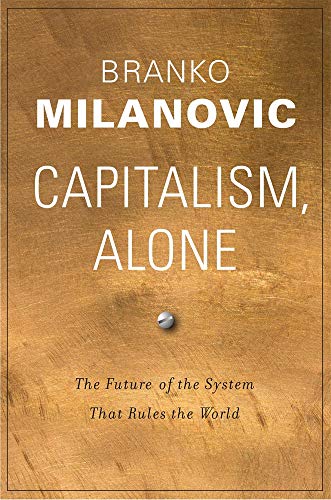Capitalism, Alone: The Future of the System That Rules the World

“Capitalism, Alone will inform and provoke readers.”
Just a few decades ago, authors were celebrating liberal, democratic capitalism’s triumph over communism and its likely perpetual success as “the end of history.” These claims were always flawed and seem particularly inaccurate today as liberal democracies face growing challenges from within and China has risen as a global power based on an entirely different style of capitalism. Branko Milanovic’s new book, Capitalism, Alone, attempts to make sense of the new world order and what could come of it. For that, it deserves to be read.
Capitalism, Alone argues that there are two main variants of capitalism that dominate the world today: liberal meritocratic capitalism and political capitalism. Both have produced significant accomplishments: liberal meritocratic capitalism, as exemplified by the United States, has increased freedom, growth, and human rights to name just a few benefits, while political capitalism represented by China has led to extremely high increases in economic growth and dramatic poverty reductions.
But, as Milanovic helpfully explains, each type of capitalism has its own internal contradictions that may limit its future success. Liberal meritocratic capitalism produces high levels of economic inequality and an upper-class elite that uses political power to preserve its privileges. Because of this, meritocratic capitalism has a tendency to become less meritocratic and less democratic. Political capitalism, where the state pursues economic gains, as in China, requires skilled administration to achieve the high rates of growth the system depends on. But political capitalism necessarily fosters corruption, which can undermine effective administration and growth and thus put the system at risk.
Capitalism Alone is at its best highlighting the challenges and contradictions of each type of capitalism and is also quite interesting when discussing implications for the future. While the book does not make clear predictions about which system will succeed, it does offer some potential outcomes.
Millanovic argues that it is possible that liberal capitalism, with its potential for elite capture, will evolve into political capitalism—a future that few, except perhaps the conquering elite, would wish for. Milanovic hopes the future ultimately leads to a “people’s capitalism” or an “egalitarian capitalism”— offshoots of meritocratic capitalism, with tax policies that favor the middle class, robust public education, greater capital ownership, and “citizenship light” for migrant workers.
While some discussions of policy solutions are thoughtful—particularly the idea of citizenship light as a way to preserve national social safety nets—the book is at its weakest when discussing policies and politics.
For example, Milanovic assumes that public funding of elections in meritocratic capitalist societies would be enough enable the public to pass laws that would move toward “people’s capitalism,” seemingly ignoring the many other ways the wealthy exert political power.
Milanovic also assumes that the lack of freedom and rights under political capitalism won’t provoke an uprising so long as material living conditions continue to improve—which is possible but deserves greater scrutiny. Indeed, his discussion of citizenship light suffers from a similar problem by assuming that non-citizens will accept their second-tier status in exchange for economic benefits. The book also has a few uneven sections with digressions into obscure Marxists debates.
Still, this book is an interesting and important read about the state of capitalism today and the directions it may take in the future. Milanovic’s history of focusing on economic data—rather than simplistic theory—and his healthy skepticism of meritocratic capitalism ensure that Capitalism, Alone will inform and provoke readers.